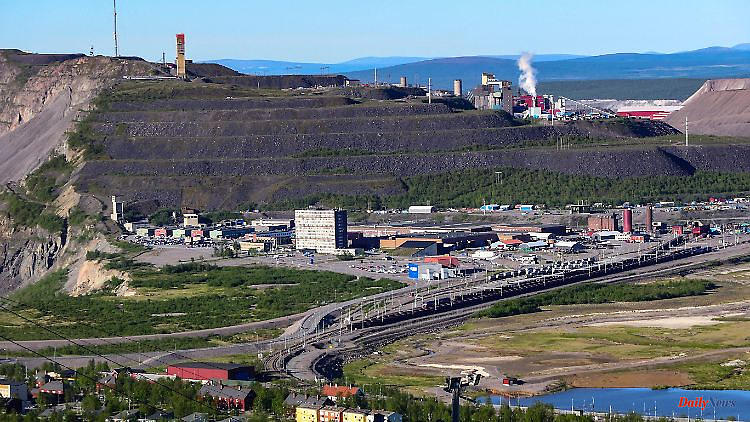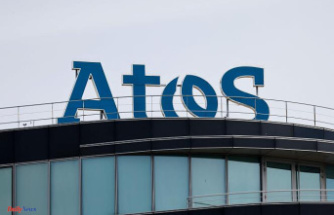It is not yet clear how valuable the record rare earth find under Kiruna in northern Sweden is for Europe. In the EU, it raises hopes of greater independence from imports from China. However, many questions still need to be answered before dismantling can begin.
There is a treasure beneath Sweden's northernmost town. More than a million tons of rare earths are waiting to be mined in Kiruna. The Swedish mining company LKAB reported the record find in mid-January when the EU Commission was visiting the area. It could be crucial for Europe's independence from imports from China. But it's too early to celebrate. There are still no methods for extracting and processing the valuable raw materials.
Harald Elsner, economic geologist at the Federal Institute for Geosciences and Natural Resources (BGR), describes the report of the find in an interview with ntv.de as nothing particularly new for experts. Experts like Elsner know that rare earths lie hidden beneath Kiruna because iron ore mining has existed in the immediate vicinity for decades.
The rock layers are not only rich in iron ore, but also in apatite. This phosphate mineral, which is used to make fertilizer, is known to contain rare earth oxides. The timing of the LKAB press release was therefore not accidental. "On the occasion of the EU Commission's visit to Kiruna, LKAB announced that it had found one million tons of rare earths," said Elsner.
The mining company is now pushing for faster approval procedures to be allowed to build mines. The EU Commission wants to comply with the request. She has already announced that she will list the most important mining projects in Europe in order to speed up the procedures for them. She will present details in March.
The Per Geijer deposit is still undeveloped. The phosphate mineral along with the rare earths can also be found in the existing mine next door, says Elsner, but in lower concentrations. For a decade, LKAB, in cooperation with the Technical University of Luleå, has been researching methods to dissolve the apatite and then rare earth oxides from it.
"In addition, the mining group has recently been working with a Norwegian company to separate the rare earths on a pilot scale," adds Elsner. However, it is a big step from these laboratory and pilot tests to a profitable process for processing. "Commercial systems cost a lot of money and you need a lot of know-how, which is currently not available, at least in Sweden," says Elsner.
There is not a single mine for the mining of rare earths in Europe. To date, the EU has imported between 60 and 70 percent of its raw materials from China. The dependency alarmed EU Commission President Ursula von der Leyen. After all, rare earths are an indispensable part of key ecological technologies. No manufacturer of wind turbines, energy-saving lamps or electric cars can do without them.
A "European law on critical raw materials" must be introduced, as the need for rare earths will increase fivefold by 2030, said von der Leyen in her State of the Union address in September last year. "Rare earths will soon be more important than oil and gas," she warns. For this reason, Europe should not repeat the mistakes it has made over many years with regard to Russian energy imports.
After invading Ukraine, Moscow shut off gas to Germany and other EU member states. The EU, for its part, imposed an oil embargo. Since then, European heads of state and government have been struggling to find alternative suppliers. Similar scenes could play out in trade with China in the near future. Beijing has repeatedly used threatening gestures against Taiwan, which it does not recognize as an independent nation. Should it invade the island nation, the US would have to fulfill its promise to assist Taipei. So the question is whether the United States and its western allies will eventually impose sanctions on Chinese products.
However, it will not be easy for Europeans to free themselves from their dependence on China. The processing of rare earths in particular poses a challenge. The expertise that Sweden lacks in this context is only available in France in Europe, as a company there has specialized in this field. The processing methods bring Elsner to another difficult point: It is unavoidable that uranium and thorium are produced in the process. These radioactive substances always occur in connection with rare earths. "The company in France also has big problems with radioactive waste," he says.
Rare earths were also discovered in Germany. A larger deposit of 20,000 tons was found during uranium drilling in GDR times in Storkwitz, Saxony. However, investigations have shown that the grade in the ore is too low for profitable mining. Deposits in Finland, Portugal, Greece and Turkey are also too small for commercial mining, says Elsner. There were two very large finds in Greenland. "But nothing is happening there because there is still no investor who wants to spend billions on it," he says. So there's still a long way to go before the treasure beneath Kiruna can be salvaged.












